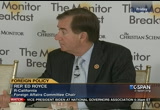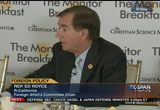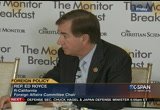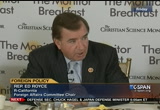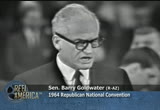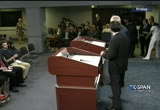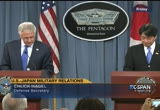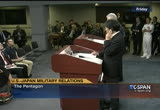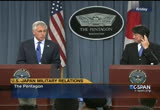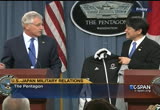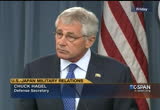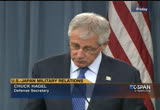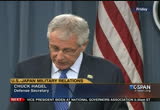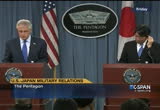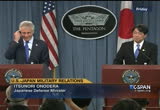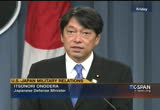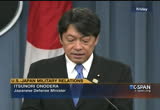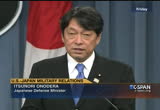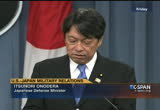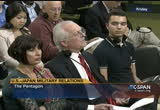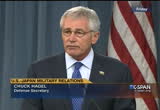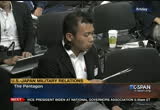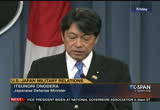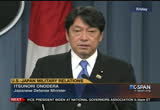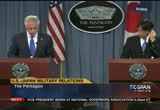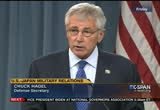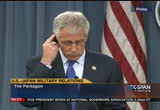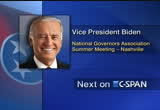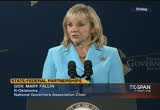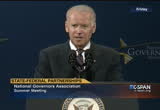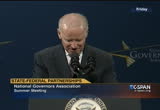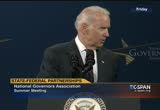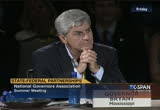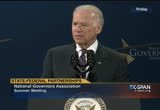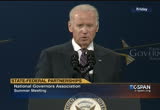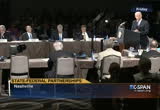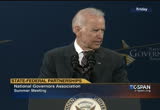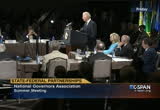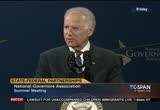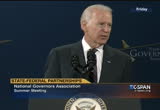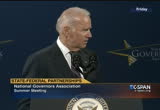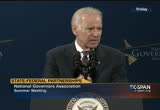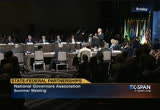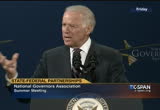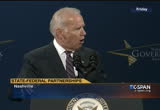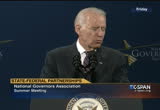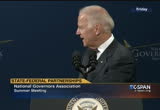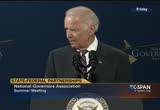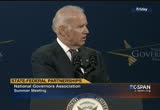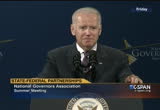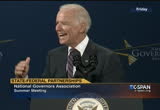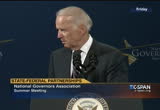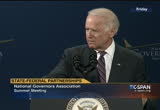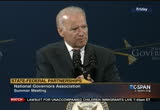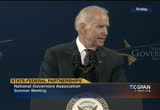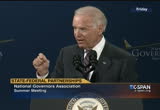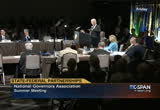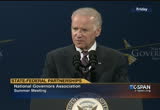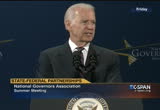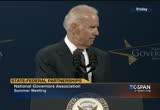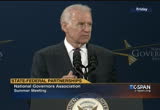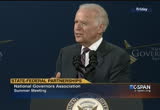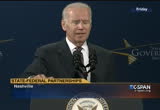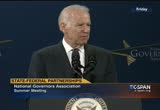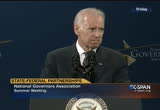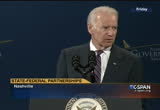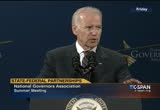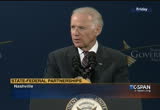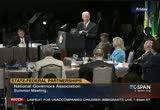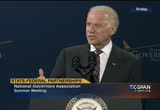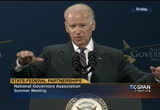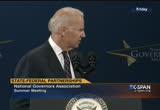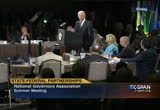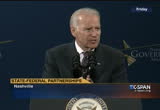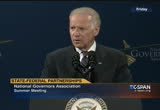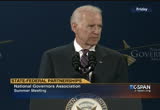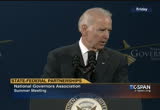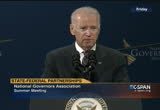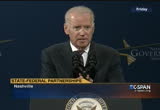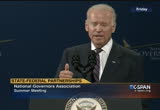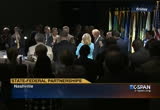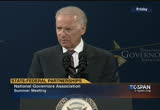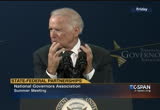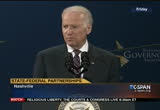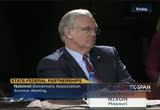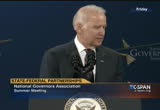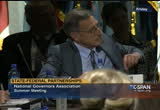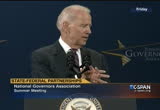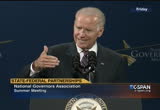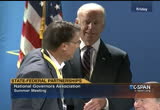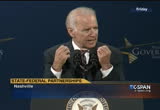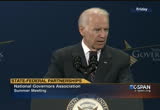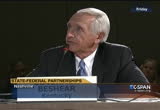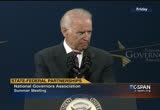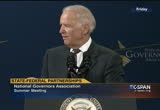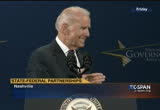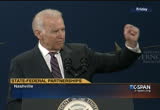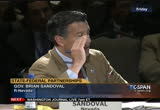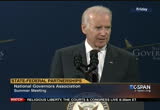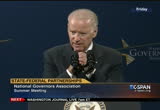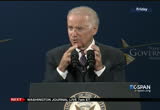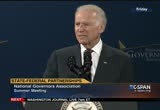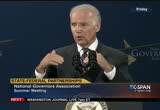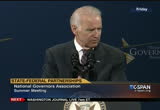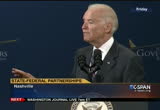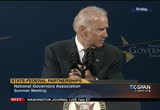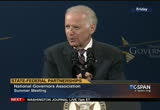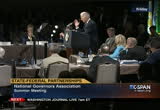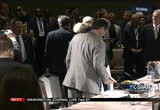tv Key Capitol Hill Hearings CSPAN July 12, 2014 5:00am-7:01am EDT
5:00 am
the southern district of new york where we would have the expertise to do with this, to have a relatively new prosecutor to this type of case and having it done in washington, d.c., i think is to lose opportunity to get information that could help additional terrorist activity, because in the past we --e able when we took table people into custody, and we interrogated them, we were able to get actual intelligence that better protected the security of the united states and our allies. >> do you think the administration's actions regarding the president of iraq are sufficient? >> have our actions been sufficient? no. our actions in our dealings with the government in iraq have not been sufficient, and it was very necessary in the past for the
5:01 am
united states to lean very heavily on the government, especially on maliki. if you were to point to one thing that has unraveled our ability of iraq as a cohesive it is theesist isis, decisions made by mr. maliki. awesomeously, he is so -- he has so ostracized the sunni and kurdish community, but on top of that his decision to go to the military -- he just put his son -- for those of you who saw that -- his son is now in charge of the military in iraq. he has gone to the officer corps and removed a competent officers and instead put in his friend. any of those friends have no takes brains whatsoever. the troops have no confidence in the officer corps as a consequence of the decision to sack the senior officers. you have an individual here who go, andp down, who must
5:02 am
you saw health the stony -- al -sistani, you saw the shia religious leader explained the necessity of an to stepping down, that is absolutely true. he has got to go, and then cohesively, the iranian state is a viable iran institution if you are inclusive with the different ethnic groups in the country. and religious groups in the country, it is very unfortunate that more pressure was not fun have throughout the process, and he has eroded the position of the iraqi state as result. >> two minutes left. a quick one? >> the situation in israel, especially with the july 20 deadline coming up with the negotiations with a rand. is the situation in israel going
5:03 am
to affect the iranian negotiations, or will it change what the catalyst is? >> i do not know if it changes our calculus, but there's one aspect of what is happening, and i saw this myself. i was in israel during the second lebanon war, and i was in haifa when these rockets were coming in. the question was, who was the enabler? who allowed hezbollah at that point in time to have the wherewithal to blanket that city? i was in a hospital, 600 victims and their. the answer was it was iran and it was serious. so in this circumstance, who is mas?enabler for ha where did they it does rockets? the answer, iran. the fact that iran would transfer the longer-range rockets that could hit tel aviv and jerusalem and that they are firing them off, and the fact
5:04 am
that they have gotten such a massive inventory, which is much how iran has put into this, that does raise the issue of how iran is a proliferator, right? so that is the other aspect of what we worry about a little bit when we are trying to negotiate with iran. how do you stop this penchant for proliferation, which they do with rockets and missiles and other types of ordnance? >> that is a nice and. thank you for doing it. >> thank you. thank you for the opportunity. [captions copyright national cable satellite corp. 2014] [captioning made possible by wisn-tv]
5:05 am
5:06 am
>> thank you, thank you. and let me remind you also that moderation in the pursuit of justice is no virtue. senator goldwater's acceptance speech at the 1964 republican convention this weekend on american history tv's america sunday at 4:00 p.m. eastern on c-span 3. >> defense secretary chuck hagel held a news conference after meeting with the defense minister of japan. they touched on the tensions in the middle east, the recent announcement of japanese collective self-defense, and strengthening alliance with pacific rim nations. this is 25 minutes. with
5:07 am
5:08 am
brought me back and asked -- a nebraska pin, which he is proudly displaying over here. and if you are wondering what that flower is, that is the goldenrod, the nebraska state flower. you don't know everything about nebraska, but that is a good start. this is our sixth meeting in, i think, a little over a year. and i want to thank minister onodera the role that he has played in strengthening our relationship. he made a trip not just to nebraska, but to other states to get acquainted with what we are doing, which is important in our alliance and in our partnership and friendship. when he was in omaha on wednesday, he not only visited our strategic command
5:09 am
headquarters, but he also got a nebraska steak, and he, i'm told, stopped by the university of nebraska at omaha, where he visited my senate archive. he asked to see my old university of nebraska at omaha yearbook and examined my picture. i don't know if he asked to see my grades or any other in-depth questions, but we hope not. [laughter] minister, your visit means a great deal. it means a great deal to me personally, but to our two countries and our partnership and our alliance. we are not just partners, but friends. and some of you may know that when secretary kerry and i visited japan last october for our two plus two meeting, it
5:10 am
happened to be my birthday. some of you may have been on that trip and some of you might recall that minister onodera gave me a birthday present. he gave me headphones that i can use when i swim. he assured me that they would allow me to swim longer and faster, but alas, to no avail so far. but i keep trying. minister, i know that you are a tennis player and you don't swim very often, so i wanted to present something to you that may help your game. what i'm about to present is -- this is a university of nebraska at omaha tennis shirt.
5:11 am
[laughter] and you get a university of omaha tennis team outfit. you shall be trimmed, slim, fast on the court, and you will live longer. >> thank you. [laughter] [applause] >> today, the minister and i discussed in our meeting prior to this conference what the united states and japan are doing together to modernize our alliance, and to ensure it has prepared this alliance to address emerging threats and challenges. as you all know, last week on the day that marked the 60th anniversary of japan's self-defense forces, prime minister abbé's moved to
5:12 am
reinterpret the japanese constitution to allow for self-defense. this bold, historic, landmark decision will enable japan to significantly increase its contribution to regional and global security, and expand its role on the world stage. our government strongly supports the decision made by prime minister abbé and his cabinet. the japanese government's decision will also enable historic revisions to the u.s.-japan guidelines. at our two plus two meeting last october, we announced then a comprehensive review of these guidelines. i discussed the review with prime minister abe and mr. -- minister onodera today, and we confirmed that those new guidelines should be in place by
5:13 am
the end of this year. together, japan's collective self-defense decision and the revised guidelines will allow japan to participate more actively in areas such as ballistic missile defense, counter-proliferation, counter piracy, peacekeeping, and a wide range of military exercises. the united states and japan will also be able to work more closely together on maritime security, humanitarian assistance, disaster relief, and other areas. we can raise our alliance to a new level, and we intend to do that. today, japan also has 50,000 american troops and their families, and we thank them for their continued hospitality and support. this troop presence is critical to our asia-pacific rebalance and we are working together to ensure it remains sustainable over the long term. we are continuing to make
5:14 am
progress toward construction of the replacement facility, and the relocation of our marine air station. the dod remains committed to being a good neighbor and to mitigating the impact of our military presence in okinawa. next week, we will begin transferring a kc-130 and we discussed additional steps we intend to take. we also discussed security in the broader asia-pacific region. we held trilateral meetings with south korea and australia in may and we will build on that progress. and i reiterate america's long-standing position on the
5:15 am
sink coup islands, which are under japan's administrative control, and therefore fall under our mutual security treaty. as i have said clearly and consistently, secretary kerry noted this as well, the united states opposes any attempts by any country to change the status quo through destabilizing unilateral actions and we oppose any effort to restrict overflight. we are working on a constructive relationship with china will stop the dialogue, which concluded yesterday in beijing, is an example, and both japan and china are participating, along with 20 other asian nations from around the world. the united states and japan's treaty alliance has been a foundation for peace, prosperity, and stability in the asia-pacific region for more than six decades. minister onodera and i are committed to making sure it remains that way for decades to come. minister, thank you for your partnership.
5:16 am
thank you for your friendship. and thank you particularly for not asking about my college transcripts. now, i will ask minister onodera for his comments and then we will take questions. thank you. >> [translator] i am delighted to be here, and delighted to travel to omaha and two washington, d.c. in omaha, i enjoyed a nebraska steak. i would like many japanese people to enjoy this delicious beef.
5:17 am
and also, i was delighted to see a picture of young secretary hagel, and it is very disappointing that i cannot share the picture with you. but he was like a rockstar to me. and regarding his transcript, i guess this is classified information. and thank you for the beautiful gift. and i would like to use the training wear, so i can train myself. i hope that you still use the headset, which is by sony. and i heard that you listen to the beatles music, so i appreciate you enjoying them. but first, i explain the summary of the recent security legislation.
5:18 am
specifically, i will explain that bearing in mind that u.s. forces and the self-defense forces closely cooperate and respond seamlessly to varying situations. the government as a whole will work on issues, such as self-defense measures permissible under article nine of the japanese constitution, as well as legislation to protect weapons and u.s. forces engaged in act in defense of japan. as well as u.s. forces. secretary hagel has offered support, as it will enhance japan's role in the regional alliance and contribute to peace and stability. based on the decision, secretary hagel and i agreed to continue
5:19 am
to focus on the revision of the 1997 guidelines for the japan-u.s. defense cooperation and the interim report on the revision will be released at an appropriate timing, so we can provide transparency for related countries. we also agreed to further deepen the specific bilateral cooperation on equipment and technology. and we would like to deepen our cooperation in accordance. with regard to the realignment of the impact mitigation in okinawa, i explained the progress of the construction project at the replacement facility. secretary hagel and i agreed to quickly implement the realignment of u.s. forces in
5:20 am
japan, including the relocation of a camp in hinoko. secretary hagel and i agreed we would close the work together on the relocation of the c-130 squadron. in this context, i raised the issue of the aircraft flying from the outside. secretary hagel affirmed that the u.s. is committed to reducing the u.s. presence in okinawa. regarding the regional situation, we agreed to continue to oppose any unilateral cooperation in the china sea
5:21 am
area. i explained updates on the relationship between japan and north korea. and i gave a thorough explanation about the japanese abductees within north korea. and also, i explained our position regarding ballistic missiles, receiving the north korean launch of ballistic missiles just recently. through close communication with secretary hagel, the japan-u.s. bilateral cooperation should be stronger and it will strengthen our regional peace. and contribute to economic growth of japan, as well as the asia-pacific region. thank you very much.
5:22 am
>> mr. secretary, a set -- a question for you about the israeli bombing in gaza. i know that your office put out a statement today saying that you had talked to the minister of israel reaffirming israel's right to defend itself, while also urging restraint. can you be more specific about the acceptable limits of israeli action in gaza? would you draw the line, for example, of the use of ground forces in gaza? and lastly, how do you respond to critics who say that the is violating international law? >> i did speak with the israeli minister for some time this morning. as you know, president obama spoke to prime minister netanyahu last night, and we essentially covered the same language and the same issues.
5:23 am
i spoke to the minister this morning on updates as to the questions. first, i think it is important to remember, and president obama mentioned this yesterday, and i did today, that israel has the right to defend itself. any country does. that right includes what they think they need to do to defend themselves. we made it clear, both president obama last night as well as in my conversation with the minister today, that we want to do everything we can to help stop what is going on. and encourage all sides to not escalate and not let these hostilities get out of control any more than they are and that
5:24 am
we would be available to play a role in helping do that. it is important that those efforts to rein in any further escalation be worked on, and we are committed to do that. so we will stay in touch with the israelis on this. there are possibilities of third parties that could help out in this effort as well, so we are exploring all options to assist in this effort. >> will the introduction of ground forces change the picture? >> i am not going to get into any of the what-ifs. i think i would just let stand what i have just said.
5:25 am
>> i will take a question from the japanese press. this question is for both minister onodera and secretary hagel. recent decision includes responding to so-called gray zone situations where infringement from the outside does not amount to an armed attack, in essence allowing the use of collective -- japan will revise the guidelines that reflect the recent cabinet decision, while china repeatedly invades the territorial islands, and while the tengion in the -- tension in the east china sea increases, if infringement like this takes place in the islands, will japan and the u.s.
5:26 am
jointly respond to the situation? what will the new guidelines change, sponsored by the china and the united states? so i would like to take the answer. discussions regarding the guidelines for u.s.japan defense cooperation are ongoing, and we are not an appropriate timing to provide any conrecte content yet, but i will continue working on this vigorously based on the cabinet decision. and when we evaluate the timing it is appropriate, we will release an interim report. and also with japan with related countries. the guideline is to ensure stability and peace in the
5:27 am
region, but this is not for putting scenarios of certain responses. but we would like to consider that japan and the u.s. will cooperate seamlessly in peacetime to contingencies, including gray zones. so we would like to achieve regional peace and stability. i would like you to understand that guidelines are not for specific scenarios, but for ensuring security and safety in the region. secretary hagel, i would like to ask one more question, which is what kind of roles and missions do you expect from the forces based on the recent cabinet decision, in addition to the previous question? >> i would think just as minister onodera said, they are
5:28 am
in the process of defining those guidelines. what exactly they mean, what are the definitions. and that is the responsibility of the japanese government and people of japan. thank you. >> next question. >> mr. secretary, iraqi military officers are saying that iran and russia are conducting attacks on sunni targets in iraq. is it not militarily responsible for the u.s. not to coordinate the iranians and the russians, given the number of u.s. surveillance flights? also the, presence of u.s. troops on the ground? >> united states is not coordinating military efforts or
5:29 am
exercises or missions with iran or russia. what we are doing is assisting the iraqi security forces. and that is what we will continue to do. as you know, we are just finishing up with our assessment teams there, and they will be providing some recommendations and guidance based on those assessments. we are aware of the iranian and russian efforts to help the iraqis, but we are not involved in coordinating any missions. >> secretary hagel, this is a question about north korea. the japanese have lifted their own sanctions on north korea, because [indiscernible]
5:30 am
on the japanese -- have conducted the investigation. regarding japan going into the situation, can you share opinions on this matter, and will kind of opinions did you exchange with minister onodera? i am sorry, go ahead. >> thank you. minister onodera and i did talk about this issue, and he explained to me as he and his government have explains this situation and actions taken to our government, as he has explained, and we are aware, the japanese government has lifted some of the unilateral sanctions against north korea. we understand that there are humanitarian issues involved for the japanese people. but minister onodera made clear,
5:31 am
as well as we have been told by the japanese government, that north korea's nuclear threats, missile threats, are still a threat to all of us. that does not change. we are in absolute agreement on that point, and we will continue to work together, as we are with the republic of korea. one of the points that minister onodra made in this issue, as well as other issues, was the importance of transparency, of letting their partners know of what they are doing and why they're doing it, and that i think is particularly important, and i applaud the japanese government for taking that approach to this issue. thank you. >> we're done for today. >> thank you. [captions copyright national cable satellite corp. 2014] [captioning performed by
5:32 am
national captioning institute] by that 7:00 a.m., your calls and comments on washington journal. coverage of the national governors association annual summer meeting continued today with a session on health care with tennessee governor bill haslam and governor shumlin vermont. five coverage begins at 10 a.m. on c-span. >> for over 35 years, c-span brings public affairs at princeton washington directly to you, putting you in the room with congressional hearings, white house ovens, briefings, and conferences, and offering
5:33 am
complete gavel to gavel coverage of the u.s. house all as a public service from the private industry. cable tveated by the industry 35 years ago and brought to you by a public service by your local cable or satellite provider. follow us on twitter. >> the nation's governors are national david -- national for their annual meeting. vice president biden joined them at the opening session talking about state and federal partnerships. the chair is oklahoma governor mary fallin. this is about an hour and 20 minutes. for being very patient with us. one of the great benefits of being in leadership at the nga is the opportunity to go to work with our leaders in washington, d.c. over the past two years our executive committee has had the privilege of meeting privately with both president and the vice
5:34 am
president to talk about issues, to talk about national priorities and how we can all work together. the vice president himself has taken the lead on several administrative initiatives that require direct outreach and core nation with our states and our governors. i know i've had several one-to-one meetings, direct conversations with the vice president, as well as other governors in the room. is that direct conversation, the direct access that's been very beneficial to our individual states in helping us develop a better state and federal partnership. as the senator from delaware for 36 years, he is a leader on some nation's most important domestic and international challenges. he served as chairman or ranking member at the senate judiciary committee for 17 years and chairman or ranking committee member on the senate foreign relations committee. and the 47th vice president of the united states, joe biden has continued his leadership on
5:35 am
important issues facing the nation. the vice president was tasked with a mini the american recovery and reinvestment act at a time to which i know i personally called each and every governor to talk about the national economy and our state's economy. he also penny to draw on his foreign policy expertise, advising the president on a multitude of international issues. so ladies and gentlemen, it is our great pleasure at the national governors association to welcome the vice president of the united states, joe biden. [applause]
5:36 am
>> thank you all. please, please, please sit down. mary, thank you for the great introduction. as you stood, as you mentioned that i had the responsibility to implement the recovery act, and i got to meet with, speak with, multiple times as all of you, hey, how are you doing? [laughter] a lot of old friends. excuse me. and it reminded me of what lincoln and i used in the. it reminded me of what used to be like serving in the united states senate. we actually liked one another than. we actually got along with one another. and deal with all of you has been one of the pleasures. i mean this sincerely, of my tenure as vice president. and saw a lot of you back at the white house not too long ago,
5:37 am
and i want you to know that i want to thank, i want to thank bill for the passport to get back into tennessee. i appreciate very much. he said you here last week. hopefully you're not coming next week. no, he didn't say that. i was your last week actually. [laughter] but, you know, folks, i probably shouldn't say this, but -- [laughter] but then again, i'm joe biden. [laughter] [applause] as, no one doubts what i mean what is a. sometimes i mean all that i say. but i mean this sincerely. i was thinking about this a lot the last, the last three or four weeks. the greatest honor of my life was to be united states senator and serve for all those years in
5:38 am
the united states senate with some of the greatest, finest people i've ever known in my life. but, and i loved it. and there's always been very, very tough politics of in washington. i got there when there was still some of the old segregationist were still there, james eastland and a whole lot of other folks. but even in those days when i got there, and the politics was intense, ideological differences were real. but it never got to where it is today. it was never personal. it was never cast in the context of you are good or bad. there was a presumption that the other guy or woman you were
5:39 am
dealing with was acting in good faith. and governor bryant, you know, both your mississippi centers -- senators act is supported when i tried to get a nomination early on, and we had come on civil rights we were a thousand miles apart. and most importantly you didn't question the other guys motive. you really went after the judgment, you know, it was like hammer and tong fighting over so many fundamental issues. but it was always about a judgment, not the motive. and the way things have gotten today, and i'm not singling out any party or in a group of people, just the politics, the culture in washington now. it's become too personal. it's too corrosive.
5:40 am
and i was saying to peter earlier today that you folks, the democratic republican governors, are the best hope we have to bringing back an atmosphere where we can disagree without being disagreeable. where we can have significant ideological differences, but yet at the end of the day, it's all about trying to find a solution. and granted, it always looked better from the outside than inside. but dealing with you for the last six years, you in an editorial says, the vast majority of you respect one another. the vast majority of you, i assume all but i don't know, the vast majority of you treat each other with respect. you are not dismissive of the
5:41 am
other guys or woman's ideas. and you cooperate in ways that i find badly badly needed. you know, we are, excuse the editorial comment, we are only one country. we always do best when we act like that. and it's not the american people are divided. our politics is dividing them, the way we conduct our politics is dividing them. and so i look to you all. we look to you. i think the answer is not just in terms of innovative things are coming out of you and not congress. it is also joined the ones of the greatest respect among those of us who are elected in your states, because you are about solving problems. i know, i watched my governor, i
5:42 am
think is a great governor. i watch come we have real differences in delaware. i mean deep differences. that i don't, it doesn't get out of hand. it doesn't get out of hand. i watch martin. i know he operates in maryland. i know well. and so i guess what i'm trying to say is, and i'll get on with the business of the day here, but i've enjoyed working with you and i think you've got to lead this out. i think you've got to lead us out of this, this mess we are in. because you and i, we all know the vast majority of people elected in the house and senate, oath parties, want to figure a way out. they know this is corrosive. when you have a national poll showing that republicans in congress have a 78% negative rating and a 14% positive, but the democrats are 65% or whatever, negative.
5:43 am
this country can't run that way. we are the most heterogeneous country in the world. you and i know that in the next five years, those of us who are caucasian, you will be an absolute minority in the united states of america. we've got to get this right. so my editorial comment come we are looking to you. we are looking to you, and this will change. this will pass. but we've got to get past it a heck of a lot quicker than we have so far. you know, and i think the old anglo expression, the proof of the pudding is in the eating, because of your cooperation and leadership, an awful lot of things are getting done. an awful lot of things are getting done. we had 52 straight months of private sector job creation, a
5:44 am
total of 9.7 million jobs because working together, working with you and you with one another, you create conditions in your state that has brought more money off the sidelines. and you've sparked economic recovery in most of your states. matter -- manufacturers have added 600, 686,000 jobs in the past 52 months because working together, you made the needs of manufacturers a simple part of your state policies. diversifying your indeed resources, cutting the red tape, supporting emerging technologi technologies. they are democratic or republican ideas. but you have done it. exports have increased to a record-breaking level for the fourth straight year, $2.3 trillion, with capital goods and and national supply leading the charge. nudges agriculture. there's always agriculture.
5:45 am
then why is it happening? because of the conditions you provided in your states. you make it a priority at the state level to connect this is directly with international markets and opportunities. and many of you, many of you have invested in infrastructure maintenance to give products in your state to the rail lines, the ports, to the links of the world. according, i'm so tired of hearing people in both parties, but this is one part, although the more any other party about how bad off america is. what terrible shape we are in. i have not traveled almost a million miles since being vice president. you will not find a single world leader in any country who would not trade places in a heartbeat with the president of the united states come to be president of this great country.
5:46 am
not one. i challenge you to find me one. the states, the norwegian states, they are doing great, but they are part of the eurozone. there's a whole lot going on around the world. in 2013, i hit about how america is so far behind. one of the leading firms in america does a survey every year, and they do an international survey. and they asked the question, what is the country that is most inviting of and most desirous of welcoming foreign direct investment? where do you want to invest your money? ladies and gentlemen, last year the united states once again overtook china for the first time in 11 years as the number one choice for foreign direct
5:47 am
investment. 2014 survey came out, and begin the united states is number one. but here's the point. pulling away from the pack by the widest margin ever recorded in the history of this survey ever, ever. in every region of the world, in every economic sector, foreign investors see the united states as the best place to invest their money. ladies and gentlemen, simply put, we are in better position than any nation in the world to remain the leading economy for the 21st century. nobody else is close. everybody talks to me about china. i know, i know president xi better than any elected official just because i spent more time with him. i traveled with him five days alone in china and the traveled for of the five days here in the united states.
5:48 am
i recent came back for five a half hour meeting with him. i want china to do well, but china not only has a problem with energy, shortage of it, they don't have water. hear me? they don't have enough water. they have a divided population. they have to create 9 million new urban jobs every year just to stay current. they have to grow at above 10% per year to keep this bargain they have with an emerging middle class which is we will let your economy grow as long as you let us stay in charge. so, folks, if you're ever going to be involved in the business we are all in, this is the time to be in. it's the opportunities are so immense. but each one of you governors know a note to maintain this advantage, continue to grow our
5:49 am
economy, we have to stay ahead of the curve in investing into very important areas. much we can talk about today. mary, you and i talked about and we are about to talk about a lot. the first is infrastructure. and the second is investing in making sure we have the highest skilled workforce in the world. they are absolute basic requirements. basic requirements for us to be the leading economy in the 21st century. and on both scores, on both scores we are way behind. we are way behind. you are the ones leading in your state. without much help from the united states congress. i know i'm preaching to the choir when i talk but importance of infrastructure. almost everyone of you in this
5:50 am
room i've had private conversation with about a major infrastructure project in your state from a highway to report to a canal that would have a significant economic impact on your state, if you have the resources to be able to do it. these are the projects which would pull millions nationwide, billions of dollars off the sidelines, not just federal dollars, billions of dollars off the sidelines, creating a virtuous cycle of more efficiency, more productivity, more jobs in your state. i stood on the water's edge with the governor on ally and governor haley -- governor on ally and governor haley discussing the need for modernizing out east coast ports. to accommodate these really new massive can. >> ships. i took several of my colleagues down to the panama canal to witness the construction. it looked like the great pyramids. they are gigantic.
5:51 am
they will accommodate ships that are 160 feet wide. they are five and six stories high. they carry twice the cargo at half the cost. yet for a significant number of ports from the gulf of houston all the way up to maine, they can't birth in the sports -- in these ports. martin can tell you. governor haley can tell you. the state of georgia can tell you. port of savannah, it accommodates 278,000 jobs in that state. i forget the number in maryland, but it's gigantic. and yet we are diddling. you are doing all you can.
5:52 am
you are attracting investments. the federal government is sitting on its hands because they can't get the so-called worker fell through and they finally got to overtime to figure out how to allocate those funds. i walked with governor quinn along the mississippi river, talking about the critical connection between rail lines, highways and waterways. and i sat with governor cuomo in albany as you laid out a remarkable upgrade in new york's power grid, bridges, tunnels that are being rebuilt in the wake of say in the. but being rebuilt to a higher standard, not being rebuilt to the status quo, to a higher standard. going beyond fundamentally rethink and reinvent the states infrastructure in the 21st century. one of the primary
5:53 am
responsibilities of the federal government regard to infrastructure is to provide the seed money for the infrastructure. all the way along for the beginning we have done this. the first national road was built by the congress in 1808. you had the governor in new york named dewitt clinton built a thing called the erie canal, generate in those days millions of dollars off the sideline. connecting the east coast with eventually to the west which at the time was ohio. interstate highway system, folks, you know that manufactures locate where they can access modern railroads, highways, ports, airports, canals to get their products to market more efficiently. you can make them at the same
5:54 am
price in hong kong, the united states, that you can ship them to market 25% faster and 40% cheaper, where are you going to go build your widgets? and manufacturing is coming home in droves. why? because we are the cheapest energy in the world now. has we have can we protect intellectual property. with the court system that adjudicates and disputes fairly. we have the most productive workforce in the world. that's not my judgment. that's just an outside group, three times as productive as chinese workers. how long are they going to stay? imagine i if governor kasich, io know if he's here, i just don't seem, from ohio, he can tell you project we built that he ended up building, but the railroads built in east baltimore, ohio, connecting, it is a gigantic
5:55 am
switching station that makes the chicago stockyards of the old days look like it small. really. it's 100 acres sitting out in farmland, but they will have double-decker trains, i mean, be able to double stack boxes, boxcars, containers, taking all the stuff westinghouse is making, and carrier, and all the rest and the old manufacturing and they will get to the port of baltimore one quarter of the cost, three times the speed. what we are doing, what you are doing is we're widening tunnels so the stress can go through with a double decks on on them, switching yards are changing. it's kind of a profound impact. tractate transportation system is today, and i know you know all this, more than 52 million tons of goods worth
5:56 am
nearly $46 billion every single day. almost 40 tons of freight per person per year for everyone who lives in america. that's only going to grow. what about the rail system? is a growing anywhere near proportion? what we need now, let alone, let alone, we are going to need. big debate, you know this in alabama is whether not you've got to slow down rail freight because it's too dangerous. you've got to move it at higher speeds. it ain't the rail car, gov. it's the rail bed. but you all know, today's infrastructure is instead prepare. the american society of civil engineers says we need
5:57 am
$3.6 trillion, with the key, and investment in infrastructure by the year 2020 to maintain, to maintain our needs. yet we only and best 1% of our gdp in infrastructure. we write 28 -- we rank 28th in the world among advanced nations in investment in infrastructure. looks as though the congress will do a short-term extension of the highway trust fund anyway, and by the way, you all deserve the credit. ..
5:58 am
airports, and i know i get in trouble. i wasn't the only one that set it. the governor in the state of new york said it. it wasn't a criticism. i put you in laguardia airport or an airport inside your states and drop you at an airport in beijing blindfolded at 4:00 in the morning asking where are you. you're thinking of the united states, and you should be. when you're in some of your big airport you're going to think you're in another place. why is that? what are we doing? what are we doing?
5:59 am
infrastructure used to be -- and i served the united states senate for 36 years -- used to be the only fully totally bipartisan issue there was. when that all of a sudden our memories go dim? the plan we've put forward were open to other suggestions related to that was a plan that existing taxes, closing tax loop holes and rewarding companies, that reward companies for going overseas. there may be other combinations. this is the way you pay for it. in the investment infrastructure will create millions of middle-class jobs and generate economic growth. i don't know a single governor in any political party no matter how far left or right you are
6:00 am
who doesn't want a job that yout you can raise a middle-class family and it saves you a lot of problems. you get a choice between a job that is a minimum wage job and a job that someone can make a decent salary and benefits it is the best thing to contribute to your economy regardless of your politics almost every one of those infrastructure jobs are just that. none of them are minimum-wage jobs. and you all know better than anyone else the incredible ripple effect of infrastructure projects. it means jobs at the end down the supply line in every business and communities in the states. that's how you build up the economy. that's how we built it in the past. in addition to the infrastructure, it is critically important that we have the most advanced highly skilled workforce in the world. and madam chair that you and the
6:01 am
nga ha have been in the forefrot of this. you've been focusing on the workforce investment and i believe that without your help congress wouldn't have passed the workforce innovation opportunity act. again, you did it. because of your work and leadership you've been able to reestablish a bipartisan consensus on the workforce innovation and the opportunity is worth investing in because prior to this all these programs were worth less. let's cut them all out. that was the one argument going on and the other one was it's not going to have to change. well, no. but there is a need both for significant reform as well as a significant investment. the act that just passed increases funding levels by 17%
6:02 am
and eliminates 15 programs and increases the accountability to make sure the programs are getting the job done. that is how many workers as the program placed. how much are those workers earning? are they on the job six months later? because if they are, the program is and worth it and we should apply standards to it, that we should have the program, programs that provide flexibility that you ask for in your discussion with me and my staff as well as the hill by allowing the funding to be used because you know better than anybody else to train people already on the job so they can improve the skills an their skip the career ladder. i'm probably the most accessible vice president in a long time just because i get to go home. i still ride amtrak. and i go home.
6:03 am
i go through your train station more than you do. [laughter] but here's the deal, what do you heahere at home? more people are getting jobs. if those people had jobs that had been totally stagnant for the last two, four, six years you figure it out. you talked about the need to invest in people with jobs now to increase the capacity so they could move in addition to those who are unemployed but we still have a lot more to than just passing the act because it is absolutely necessary we have that skilled workforce to maintain the 21st century. that is a given. by the end of this decade more than six out of every ten jobs are going to need a form of postsecondary education whether
6:04 am
it is a bachelors degree or associate in some form of program and manufacturing facility. there are over 100,000 manufacturing jobs in the nation sitting empty because they can't find a skilled workforce to meet the job. go to the stat state and wisconn and you've been working on this. they open a big new plant and find out they work with the local community college and bring the machinery and off the floor into the community college and bring their own managers into the community college with some help from the federal government through our program train these folks. i think a player i up there it 8 week program.
6:05 am
don't hold me to the exact number but it's like a conveyor belt. salaries are $850 if memory serves me correctly. by the end of the decade, the boston consulting group which is ahead in the last ten years estimates the number high skilled manufacturing jobs needed in the united states will be an additional 875,000 a lot of them are sitting empty right now but by the end of the decade we need 300,000. we have done an extensive survey since the president asked me to take on this responsibility to come up with the new job training initiative. 300,000 more software developers are going to be needed. you know what the average salary is in today's stock dollars? $87,500 average salary. we need 12,000 more computer
6:06 am
network support specialist salary is. they are the folks in the companies were in your offices that keep your systems running in-house. average salary, $59,000 a year. we need to have a million more nurses. average salary, $65,000 a year. we need 30,000 more physicians assistants. average salary, $91,000 a year. we need 10,000 more petroleum engineers average salary, $130,000 a year. you don't have to tell the folks from oklahoma and texas and many other states about that. by the end of the month i'm going to deliver to the president and all of you with an extensive job training strategy that has attempted to meet these needs. many of the strategies are
6:07 am
directly from the conversations. the path to the employment is to create more partnerships between employers and the community college and nonprofit organizations. what have you done up their? it works. the president's job council put together the, quote, right skills now program. the governor in nevada has done a hell of a job with this. you really have. you've taken an idea and you've made it work. you've got employers which makes the planes, ships, trains. is that the correct pronunciation in the community college? the master curriculum. he came in and told them what you need it. you set it up for them and the department of labor whatever it
6:08 am
is in question you put them together and these are good jo jobs. my buddy in new hampshire had a great program that provides on-the-job training for companies that higher unemployed workers directly into open positions and train them while they are in those positions because they got the high-tech stuff up there already. watch them put it in action. there was one that was an engineer and guess what. he had worked as an engineer for a large company for 31 years. he was about 54 or 55-years-old. he had all of the skills. but he couldn't afford not to have a job to go back to school so they would have this
6:09 am
on-the-job training program and it works. it's not a panacea but it makes a difference in all of you because you have to walk out of your offices through the capital out through the door and people see you every day you don't get in the car and go taken through a gate. one thing i never worry about anymore i used to be worried about traffic congestion but there is none in america. i don't know what happened. you've talked to ordinary people, you walk outside. you see them. what do they talk about? this is one person and one job at a time, one opportunity at a time. and many more of you have successful programs in if i had an opportunity to go through them all because i know where i've been quite frankly you've been really cooperative in this outfit to give us all your best ideas of what's working in your
6:10 am
state and what things are not working in your state but that's why we have invested nearly $2 billion in partnerships between businesses, community college and the result is real. the certificate degree programs designed by the employers who will hire the students when they complete them. that's why you we invested $100 million in the competitive grant program to bite the h1b visa program where silicon valley and other firms said they can't find enough coal fired employeecola fiveemployees in ts and the other certificate brings folks over. it's the h1b program. was there a way to increase the apprenticeships and they pay a fee for that as well so that's how a lot of this gets paid for two expand such as information technology.
6:11 am
of the largest companies in the world cisco, everyone was there. i asked i said right now there are -- you will remember this in the senate we have to vote on the visa. there are 550,000 this year or it's been over 480 to 580,000 per year. they don't have the jobs in the high-tech industry and there is a whole thing they have to go through to prove that nonetheless, 555,000 h. one b. visa holders this year. so i asked this group of the 20
6:12 am
leading high-tech firms in the world. how many of those jobs can be filled by americans with a two-year degree high community college degree? the answer was 200,000 per year. what are we doing? 200,000 a year. i met with these folks and they are helping me put together a program. they are helping to train and encourage more individuals to become computer programs. you are talking 85, $90,000 a year. a two-year degree. imagine if we could train 200,000 programmers who qualify for these jobs. the average salary is 87,000.
6:13 am
almost 90,000. so here's what this outfit has done. they are helping k-12 kids tea teach. they help schools create and expand computer science curriculum. last year 15,000 classrooms in america began teaching the curriculum. they also encourage all of you in the states into some of you have already done it to a lower your schools and talk to the local school districts to allow two counts the classes as part of high school math requirements. you realize less than 1% of high schools do that now? for example in the past year they successfully lobbied oklahoma, illinois.
6:14 am
i don't know how it went. arizona, new york, california, idaho all of whom have recently added computer science as a core subject receiving state funding. they are making it feel accessible. for example this year code.org encouraged americans to code for one hour on the websites 30 million americans participated. 30 million. heck of an initiative. all of you know what i know. americans want to work. they are willing to work creatively are willing to be re- trained. if they think there's any possibility of having to re- trained to be connected to a job come help them to better themselves and their families that spend the big problem in all of our state and federally. i've talked to some of you about
6:15 am
this. connecting the job opening. you hear these statistics 100,000 high-tech jobs. when i go out there the kids i grew up with and those that grew up with their children where are those 100,000 jobs flex do you have a list? tell me where they are. how do i get them, what skill do i need? in the free market they are required to get the jobs and the people that need the jobs. many of you have done a lot of this stuff. i met with a company called glass door. they are collecting and sharing additional information they have
6:16 am
the stores into stores of information. so now what they have on the website and you are looking for a particular kind of job. in the interview process and the culture of the data that is elected in a country so for example if you want a job as a software developer you can go to the glass door and let other glass door users have said about what it's like to work for her interview with that company for that job. on traditional websites you find the posting of the basic salary information. currently glass door partnered with more than 1,000 college universities to give access to the sites. they helped me put together an event at the white house that was called the data jam and with 24 high-tech firms. some of whom have already connected with some of your departments of labor to make it
6:17 am
clear for the jobseekers what jobs are needed, number two, where you can get the skills. number three how can you get to help pay for those skills and with those skills are and where you can use them to get a job. i sat at a table there were 24 outfits that said they had different tables set up in the white house in the oeb and i sat with a representative company that said i want to show you something. and they said i not allowed to tell you their name but it's in the hometown of delaware works at the port of wilmington and he said he's out of work. so he wanted to know where else he could get a job as a warehouse. so they pushed a button and every single warehouse job within three hours popped up in every single warehouse job in the entire east coast popped up. they had a map showing the
6:18 am
density of the jobs and showing that there is a lot of openings in the eastern part of the state in western pennsylvania. very few and not as many in southern delaware etc.. they also show you live in% of warehouse workers when they lose their job they don't know what they are qualified for. i've been working in the warehouse. well it turns out the same skills that require the warehouse worker qualify you to be a truck driver. so you push a button and get every single solitary truck driver opening that is in the same region. truck drivers make on average $4,000 a year more than warehouse workers. $45,000. they then say with the skill set is, what the expense and experience is required, what the expense is to get the training
6:19 am
that you need. they actually give the workers a physical map showing them where the company is, telephone number and a map as to how they can get the training they need for the job. they already had a career. they've now lost it and most people you know are in their 40s or 50s or lost a job. what is the first thing you hear from them? they talk to you like they do me. i don't know what to do. i've done this my whole life. i used to have a friend that was a great basketball player. i don't want to give away my age but i will. he went to providence college when they had all americans in all-pro and the nameless pete maclachlan. died of throat cancer, good friend of mine. he would say to himself he wasn't the sharpest on the table but he was a smart guy and he
6:20 am
used to have an expression. he would say you have to know how to know. let me say it again. you've got to know how to know. those of you that went to law school what i but is the first g you have to learn? you have to learn how to access the information that you need. it's called legal procedures you spend a whole year learning. you need to know how to know. so many hard-working decent americans they don't know how to know. they don't know where to go and they are intimidated when you tell someone 51-years-ol 51-yeat has lived a middle class life you're going to go back and be re- trained. it's intimidating, but it's there. let me end where i began. every single one of you knows and i know the way america was
6:21 am
built was on the back of the most modern infrastructure in the world. you also know as well as i do americans want to work. america was built on the shoulders of those people. the world is changed. it's more complicated. it's more global. the skills required to succeed our sophisticated but our population is thoroughly capable and requires the skills and thriving in this new world. every one of you know the american people are tough. they are determined. they want to work. the american people have -- this is a reality. they have never, never, never let america down to giving have a chance. ordinary people never -- we have to give them a chance. and in the process of giving them a chance, we do everything
6:22 am
from lower our deficit to increase our productivity to enhance our place in the world, but to have to know where the jobs are and what training they need and how to get the training that our responsibility. our responsibility to do both of these things, to break through the gridlock in washington and rebuild america and breakthrough the complications that tens of americans still face in terms of how to advance their career. i think if we do both of these things there are things we have to do. ladies and gentlemen the american people are ready to work. throughout the history when given a fair shot, they have never, ever let the country down. i will conclude by telling you
6:23 am
that when i was in china after we had been downgraded because of that ridiculous showdown in the last administration between democrats and republicans and the rating was downgraded and i got to -- i was in china two days later. actually that's not true, four days later for a five-day trip. and then the president hu welcomed me in the great hall of the people. there were a thousand people in there and more press than i have seen because they were grateful. we have been downgraded and the prospects look a great deal better by comparison. >> the president was very gracious and he said through the contemporaneous translation we have faith in you. we know you will come back and
6:24 am
they went through the whole thing about what you have to deal with and he listed our problems and i said thank you mr. vice president so much. i said i've noticed i've read that you are getting a lot of criticism for buying millions of dollars worth of the u.s. treasury bills two or three days after we were downgraded. i said if i were you and my international staff nearly die i said if i were you i wouldn't buy any more u.s. treasury bil bills. we don't need you to do that. it's true you 02% of the financial instruments. that's true. that 86% are owned by the american people. there's never been a default on the data so i know what is causing you some political difficulty so i wouldn't buy any more. it's okay. i then set by the way we do have a problem with our what we refer
6:25 am
to as the entitlement system you call it and we call it social security and medicare and medicaid. we do have a problem but ours is a political problem lacking political will. but i said my god mr. president, if you need help i don't know what you are going to do with your one child policy creating the disaster that has occurred. by 202 2025 people have 2025 yoe working to take care of all of the people retired. if we can help in any way, we will. you may remember i came back and predicted a change on the one child policy. one year later they did. my generic point is to take advantage of this opportunity. take advantage of the opportunity for the united
6:26 am
states to lay down a new marker for the 21st century. we have the greatest research university in the world. we have the most incredible system for allocating capital in the world. we have more venture capitalists ready to go in any place in the world. we have a greater -- it goes on and on. so what i am pleading with you to do is to continue to teach us a lesson by getting along with one another. continue to do the practical things that you are doing to demonstrate the use two issues are not partisan issues. they used to be a national consensus on both of them. the sooner that we reestablish that consensus, the faster we are going to grow and create real jobs and we are going to
6:27 am
continue to lead the world in large part because of all of y you. [applause] i'm not hanging around for applause. i'm supposed to take questions. i'm sorry. >> we appreciate your time and we know you have a very busy schedule. we are going to take a couple of questions. we look forward to having that sign but how would that legislation affect the current work on the training programs.
6:28 am
the bottom line is that will enhance it. it's the bare minimum because we should measure objectively whether the program is working. it should be applied to everything in my view. those of you that work with me in the act the first time we did that is when we had less than one and a half% of waste, fraud and abuse according to the outside groups so there should be an objective matter to be the measure whether these programs are worthwhile. by example, back in the 70s when the shipping industry began to leave the united states, my state of delaware and the state of pennsylvania boarded one another obviously, and there is a building corporation major corporation right down the delaware pennsylvania border along the delaware river and it
6:29 am
went belly up and consolidated left and lost their jobs so we had a job training programs. program. we trained 14,000 cooks. nobody needed any cooks. it was a job training program but it was almost a makework program and so as the reform secretary governor o'malley out of secretary of labor says we have to not train and hope we have to train and place. so one of the additional things that we have to do our make sure that we are able to connect the actual business openings that are there with the people who want t jobs and then figure outf they don't have the skills how we can get them the skills that meet the needs of those employers. this bill doesn't -- that bill doesn't do that. it does some of that.
6:30 am
but i could go on for longer but i've already gone on for too long area that's why in the budget we have left over of the 5 billion this year, 2 billion to increase the number of apprenticeship programs for something that is being done well in south carolina and is being done well in a lot of your state. to figure out and encourage the best outfits in your states that are really willing, ready and able to get into the business of hiring people in a lot of them are. they have the capacity for training the workforce needed to fobefore the jobs require new skills just because of the globalization and modernization.
6:31 am
by the way it will not be one of those, those that know me and do like governor nixon, there is no pride of authorship. i'm hoping that you all are going to say i like that part or i don't like that part. this will be the comprehensive look quite friendly ever and we will see we will be able to do that. mr. vice president, those as you may well know that states use workforce programs to not only attract to help our existing businesses grow. but for that to be really successful they have to be able to work with those businesses and be responsive to them. how could the job workforce programs be doing and serving in and listening and responding to the businesses how can the
6:32 am
governor's help worked better? they don't know how to listen. whether it is the community colleges or the colleges or the training programs. that is the basic blocking but it's hard. i don't want to keep talking about my buddy in vermont, but the high-tech nonprofit up there with other companies in a very precise way. they have all of the needs and companies not only in vermont, but in the area then they went out and they looked at all of the total unemployment in the state they tried to match the skills and started putting people back together.
6:33 am
when you are a state like mine you are the only state by the way before you pick on little delaware, five of you all are smaller than we are. [laughter] we are looking to use, the governors. to identify those businesses that in fact have needs and literally physically bring them in. then there is $100 million
6:34 am
available. the business of the employers why don't they go and train them? either member when dupont bought conoco. dupont needed a number of people especially that didn't have on site. they had some 8,000 additional employees. a lot of these outfits are not so sure. they are not so sure that the workforce is going to materialize. they are not so sure the people they are training are able to connect because of the new technologies in a particular organizational structure like the community college. so this is about marrying them up in a lot of you have done that very well already. as a matter of fact, the governor in south carolina has created a central office. a central office within the community college system.
6:35 am
they have the apprenticeship programs and they are the greatest guarantee. they are able to raise a family while they are learning the skill 89% if memory serves me correctly and i've asked the staff to correct me, ed 9% result in a programming job in the studies we've done. they had that job a year later but it's the surest way and in the job average $60,000 a year in those jobs, those companies where they are prepared to have an apprentice. they aren't looking for an apprentice for the 22,000-dollar a year job. and so it is the best bang for the buck but it's about bringing
6:36 am
together we can give you a lot of detail on this program and it's going to be you all that make it work, not us. if it works and suits the need. you haven't smiled the whole time. [laughter] i'm getting worried. [laughter] anyway. it's going to work like all these programs you make them work and we will give you the detail. also i think what's going to help and it's presumptuous of me to say this because we are not doing it, i'm just -- luck the federal government doesn't do a lot of things really well and
6:37 am
there are things they can do better in the states, but i'm being serious. buabout what we can do is we can identify best practices because we can grab and identify those things in all the states in the entire country. so he can be a clearing house in a way and i think what you're going to find remarkable is these medium-sized tech firms who are coming up because there is a market. there's a market outhere is a mo help people get employed. they can make money and it is getting down to a granular capability that you will be able to have in your department of labor or not. this is what they showed me. there are 42 warehouse jobs in north philadelphia at the xyz
6:38 am
plant. here's the phone number. here's the requirement. here's the application. if you can't go to philadelphia, do you want to stay in the state of delaware there are you are qualified based on the criteria that you have met as a warehouse operator you qualify for truck drivers. now i know that federal express needs to people. here they are. this is what they make. here's the outfit you can go get help in the training program etc.. it's going to change but it's not coming from us. it's coming from the free enterprise system because there is an opportunity here and i think you will be able to benefit.
6:39 am
thanks to you and the president for emphasizing the workforce initiative. every time we talk to a ceo, the top priority while they like tax incentives and the rate infrastructure that priority is a qualified skilled workforce and we are all working very hard to provide them with that. in kentucky we have developed a program called the skills initiative program that is an apprenticeship program modeled after the german model of dual education. having the child getting an education and at the same time putting those skills to work in the workplace and earning money while they are doing it. how can the work that you are doing come together with things like that that we are doing in our states? >> some of the programs we are talking about you but qualify for funding to do that. i have been meeting with --
6:40 am
germany probably has the most successful apprenticeship program in the world and they do it extremely well so we have some folks over there. we've been dealing with them here and part of it as you point out is some of it starts in the schools and it starts even in your high schools you have programs where they are can be apprenticeship programs in the high schools. there is a different -- remember even those of you that are only in your 40s back when you were in high school almost every high school in america had a shop program, had a program where people could figure out whether you took it or not if you had the need or capacity and there's an awful lot of the workforce out there today that is graduating, not workforce but an awful lot of folks graduating
6:41 am
even if they do graduate that don't have the capacity to go on to college or the four year college or a community college that would make a hell of an electrician or auto mechanic, etc. but they never know if they've had a facility for that because they never work with their hands. the same works with new technologies if you have classes that have for example teaching photovoltaic technology. somebody thinks. what you are changing into some of you are doing it in your high schools you are changing your high school curriculum and your curriculum so that some of the courses that you take in high school already not qualify you for it with me to the requirement in the college
6:42 am
system so you fast-track a lot of these people. there are a number of programs in the department of education and anybody that is interested, contact me. you can contact me directly for real. contact me directly and i will give you and agenda of all of the programs that potentially could be useful for you in the kind of stuff that you were doing so well in kentucky because it's a -- you know, we start off there's almost a sense that since we don't have that capability our population is not capable. they are capable they just have not been exposed because a lot of this is not rocket science. you are doing something in the mississippi. it's just about letting people know, giving them a sense of what they think they are capable
6:43 am
of and that requires exposure but i will get anybody that wants this specific agenda programs that can be beneficial. >> one last question from the governor. >> by the way i failed to admit we are putting forward a program for $450 million for the apprenticeship programs so if you put them together you get a model and view gave any indication that it is worked, but the formula works there's about a half a billion dollars there to be of assistance. >> [inaudible] >> good. i hope having a democratic vice president doesn't hurt your reputation. >> not at all mr. vice president. i'm going to hand over to the rehabilitation your shout out because i know that's made their
6:44 am
day and that is a wonderful program that has made a difference in people's lives and in nevada. my question you've touched upon and it's similar to the governors, i would like to know how we can work with you in terms of improving and aligning the k-12 education and higher education so that our kids and students have pathways to a career opportunity and that high school graduation isn't adjusted the end. and that they have more opportunity as the moveon. >> well, first of all there is again i am preaching to the choir here some of you forgot more about this than i know that this first one i know about. a lot of it has to do with public attitude. forget the dollars into programs. let me give you one concrete example. rochester new york. rochester new york is the home were used to be the home of
6:45 am
kodak. i think that they had 38 or 39,000 employees. no minimum wage job, it's all good jobs and varying degrees kind of like dupont in my home state. and they also have a number of other would have become very high-tech operations relating to the citation and implements for being able to, like example the mars rover is made by a small outfit in rochester. but, you know, kodak doesn't make film any more and they are not a thing of the past, but i think if i'm not mistaken -- there's closer to 10,000 employees today.
6:46 am
and it is a load out of town. it was a very prosperous middle-class town. with a local college did in monrovia that he college it went out. it surveyed every business the three counties that had anything to do with topics. and it turned out what you would expect when kodak laid people off it had a terrible impact on the economy, very positive impact on the instincts out of their. they found out that there are over 200 optic companies ranging from ten people. when they went out and surveyed with money from the state as a
6:47 am
community college surveyed every one and said what do you need? do you need employees and it turned out they all needed employees. they actually have been designed programs that are as little as 12 weeks to two years there are over 6,000 people now with jobs and the average salary. they have the apprenticeships for the folks getting out of high school. so they go to the high school and the community college and they talk about these programs and the jobs available for people that are not going on to four years of college or even two years of college. but they found it a phenomenal thing. they said i don't want my kids having any of those jobs.
6:48 am
i don't want my kids doing that. and these were not for phd employees in the research department. these are ordinary people that have nothing to do with it because they said this is something where my kids can end up working with his hands and i know where that's gone in the past. my uncle did such and such and i don't want my kid working in that environment. they have the meetings and say let me explain. let me explain what's going on here. why this is a pathway. the kid may start off at 30,000 or $28,000 a year but in this route, you can get the point you can make 60, 70 to $80,000 by having to go back to the
6:49 am
on-the-job training and it begins to change the attitude. so the first -- i know it sounds silly but the first thing is convincing ordinary americans that it's a good thing for the kids to do this kind of stuff. i think that you will find a those of you that already tried it in your schools as you change the curriculum i guess is some of you that put in computer programming you say i don't want my kids to be a computer programmer i don't want them doing that. they say well it's $86,000 a year and guess what you may end up running. i didn't know that many of them lost their jobs. the jobs we are talking about now don't seem like they are real and when you start to change the curriculum they think that you are dumbing down what their kid occurred or should be. does that make sense? i know that's been your
6:50 am
experience. it's been mine in the place i've gone. number two, i think you are going to have to deal with that as you move. second, there is a program and i will get -- i hope you think he's responsive to you. i know sometimes he drives you crazy like i do. but i think one of the best we have on the team is on the duncan, to put together to get the right people in the department of education that have actual programs that marriott the interest of the community college as the high school community college and the four year college. look what some of you have already done in the states. 20 years ago if he went to where my wife is a professor at the delaware tech community college in delaware if you have your credits applied in the university of delaware because the community college was thought to be a vehicle that was
6:51 am
not quite there and it was more like going to auto mechanic school afterwards in delaware. the curriculum offered and the training and professionalism. now there's a pathwa there is au go to the university of arizona you get to go to the university of utah state or whatever. you get a pathway so that you also.
6:52 am
you've already trespass on it too much. let me put it this way, 15 years from now. colleges are not going to be four years won't. while school is going to be two years and medical school is going to be shorter. the specialists will be more. you will have a whole lot. why? because of the cost. and there is no reason why you can't graduate from college in three years in the same capacity based on a course of study you take and how long you go within that timeframe reducing the cost. so one of the incentives we are putting out to all of the universities is to incentivize them to come up with novel ways in which to deliver the same content and education in a short amount of time.
6:53 am
the more expensive university, think about it. you think i'm joking i'm not joking. i hope you all did not make the commitment to your children that i made to mine which was whatever college you get into i hope you get there. what a mistake that was. there is a reason why that had to do with three children going to the undergraduate schools and schools that were not as good as mine. they went to yale and i went to delaware. but all kidding aside there is a whole mechanism we have and like we did in the top deal there is a same program to get the universities to change the curriculum and modernize it as well as to deal with the cost and there is an entire program
6:54 am
of the recommendations i want to make it clear that there's all these recommendations as to how the high school in 2020 should look like in order to serve the needs of the community and the kids but there is a lot of stuff i don't want to bore you with that now but i know that you all look at it with the critical eye is that you should invite will give you a call. i am taking too much of your time. thank you for all the time. [applause] thank you everybody.
6:57 am
6:58 am
our committee on economic and development, and also at the same time education and workforce committee. later on tonight we have the wonderful entertainment at the lime and auditorium. see you >> next, live, your calls and comments on washington journal. and then a discussion on health care. >> baseball does strike me -- i don't want to get metaphysical about this, i am anti--- measure when it comes to baseball, but it is the pastime of an at democratic nation because it is about compromise and settle in you do not get everything you
6:59 am
want and baseball is like that. -- every team knows that they are going to win 50 games and lose 50 games. you went 10 out of 20 games just by definition mediocre. i'll 11 out of 20, you have a good chance to play in october. it is the sport of the half loaf. latest bookl on his on baseball and wrigley field and the recent controversy surrounding one of his columns, sunday night at eight eastern and pacific on c-span. this morning on washington journal, ruthie epstein will discuss the class-action law suit the aclu filed on behalf of immigrant children. fundsmith from the becket for religious liberty talks about how religious liberty is legally defined and how it is being debated in the nation's
7:00 am
44 Views
IN COLLECTIONS
CSPAN Television Archive
Television Archive  The Chin Grimes TV News Archive
The Chin Grimes TV News Archive  Television Archive News Search Service
Television Archive News Search Service 
Uploaded by TV Archive on

 Live Music Archive
Live Music Archive Librivox Free Audio
Librivox Free Audio Metropolitan Museum
Metropolitan Museum Cleveland Museum of Art
Cleveland Museum of Art Internet Arcade
Internet Arcade Console Living Room
Console Living Room Books to Borrow
Books to Borrow Open Library
Open Library TV News
TV News Understanding 9/11
Understanding 9/11